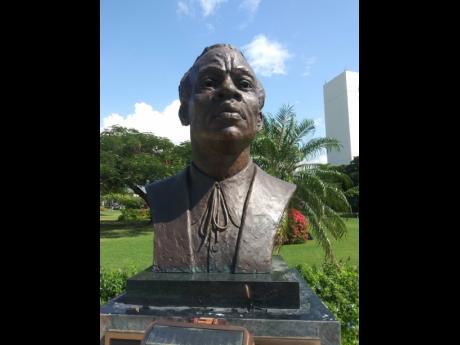The Moses Baker Story – Part II
MOSES BAKER, a coloured man, believed he was better than an old enslaved African named Cupid Wilkin, who was a Christian. Baker was converted himself after much encouragement and persistence by Wilkin. But, before the conversion, Baker became gravely ill and blind. Wilkin surmised that Baker’s malaise was as a result of his ungodly lifestyle.
Both men attended the churches of George Liele (Lisle), an African-American preacher who is credited for establishing the first Baptist church in Jamaica, at Windward Road in Kingston. Many of Liele’s converts also set up churches all over Jamaica, but it was Baker who led the church-planting zeal in western Jamaica. Some of these churches were destroyed by the militia after the 1831 Baptist/Sam Sharpe/Christmas Rebellion in western Jamaica.
Baker went to St James after his recovery because a wealthy St Andrew landowner named Joseph Winn, who had helped him with his medical bills, gave him a piece of land in that western parish, where he relocated with his wife and daughter in February 1788. The land was on an estate called Stretch and Set, near Adelphi in the said parish. Yet, the church that he established was at Crooked Spring, about three miles from Adelphi.
In his book, The Story of the Jamaican Missions, Lloyd A. Cooke quotes from Inez K. Sibley’s book, The Baptists of Jamaica 1793 to 1965, thus: “ Crooked Spring is a household word with old Baptists of St James and Trelawny … It was here that the self-denying Moses Baker, the devoted Reverend Mr Tripp, and the well-beloved Thomas Burchell were shielded from persecution by the friendly hand of Joseph Winn, and the honourable Samuel Vaughn. Because of these they preached in peace and quiet the blessed gospel of Jesus Christ.”
Baker, John Rowe and Thomas Burchell were facilitated by Sir Samuel Vaughn, a Christian member of the House of Assembly. It is said that Baker’s church was moved by Burchell to a place called Spencer’s Mountain. The church was named Salter’s Hill, and was one of the churches that Baptist deacon Samuel attended.
It was burnt after the Sam Sharpe Rebellion, and the congregation relocated to John’s Hall. A church was also established at Somerton, thus making southern St James a bedrock for Baptist church establishment in Jamaica.
FOUNDATION STONE
Baker died about 1820, and Crooked Spring was bought by brothers, Reverend J. E. Henderson and Reverend W. R. Hemderson, who desired a church to be established there, where the foundation of Moses Baker’s church lay in ruins. In 1835, a new church called Bethtephil was established at that location, but it was subsequently moved to Chatham, also in St James.
Lloyd A. Cooke writes, “The foundation stone at Chatham tells us that it was laid August 4, 1896. This new church was named New Bethtephil to distinguish it from old Bethtephil at the original Crooked Spring location of Baker’s first church, built in 1791.”
Previous to the arrival of Baker, the preaching of the gospel of Jesus Christ was non-existent on the plantations in western Jamaica, and the plantocracy was wary of Baker’s activities. Cooke says the enslaved Africans were “largely untouched by the gospel”. He writes. “Their African religions still held sway with them. And obeah was rife,” he writes.
Baker was to face opposition also from within his own church, especially from a judge-cum-deacon named Kitt. He came out of the tension that existed in Kingston between George Leile and one of his former members, Swigle. While Liele was in prison for the non-payment of a debt to help build his church, Swigle was busy undermining him. He sent Kitt to Flamstead in St James, and he became part of the congregation of Baker’s church.
Kitt’s intention was to take over the leadership of Baker’s church, and, soon after his arrival, he began to challenge Baker on the grounds that he was not fit for leadership because he did not know much about Baptist doctrine, and that, since he was coloured, he did not know how to teach the enslaved Africans.
Baker attempted to set up a ministry in Montego Bay but, initially, it turned out to be the classic case of jumping from the frying pan into the fire. He started out with the fishermen, but Baker was not successful in being a fisher of men, as he was stoned and shot at, and his meetings were interrupted. The magistrates in the town had to go to his rescue. They themselves attended Baker’s meetings, but did not find any evidence to say that he was disturbing the peace.
Despite the efforts to curtail Baker’s activities, his ministry in the parish grew and he established churches on a variety of estates. At one point, the total number of his congregational members was over 500. He was referred to as a native Baptist, but it was claimed that he was not as spiritual as George Liele in certain respects.
“Baker’s greatest contribution may have been the part he played, along with Leile and Swigle, in writing to the Baptists in England, requesting them to send missionaries to Jamaica to assist because of the problems and roadblocks thrown in their way through various laws passed between 1802 to 1807. Collectively these are known as The Consolidated Slave Laws,” Cooke writes.

